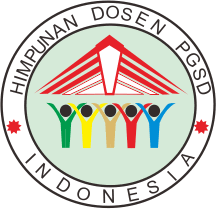Analisis HOTS dalam soal penilaian akhir semester gasal mata pelajaran matematika kelas IV sekolah dasar
Abstract
Abstract. The results of the PISA (Program for International Student Assessment) show that the cognitive abilities of Indonesian students are ranked low. Cognitive abilities in mathematics can be improved on condition that students must have higher order thinking skills (HOTS). Therefore, the government has made an educational assessment model in Indonesia directed towards the HOTS assessment model, one of which is in the Final Semester Assessment (FSA). Based on these problems, this study aims to describe the Final Semester Assessment questions for math class IV at Dukuhan Kerten Elementary School for the 2022/2023 academic year based on thinking levels, by classifying questions based on Lower Order Thinking Skills (LOTS), Middle Order Thinking Skills (MOTS), and Higher Order Thinking Skills (HOTS). There are two instruments in this study, the main instrument which is the researcher, and the supporting instruments in the form of guidelines for analyzing the cognitive level of Final Semester Assessment questions in class IV mathematics. The instrument was compiled based on according to the cognitive levels of Bloom revised by Anderson and Krathwohl. This research found that out of 35 items, there were 13 questions that belonged to the HOTS cognitive level, in addition, 16 questions were dominated by the C3 cognitive level, then 3 questions included the C2 cognitive level, then 3 questions included the C1 cognitive level. In this question, there is also a stimulus in the form of pictures, graphs, and diagrams.
Keywordsi: final semester assessment, High Orders Thingking Skills (HOTS), MathematicKeywords
Full Text:
PDFReferences
Suryapuspitarini, B. K. (2018). Analisis Soal-Soal Matematika Tipe Higher Order Thinking Skill (HOTS) pada Kurikulum 2013 untuk Mendukung Kemampuan Literasi Siswa. PRISMA, Prosiding Seminar Nasional Matematika, 876 [2] Kamiludin, K. (2017). Problematika pada pelaksanaan penilaian pembelajaran Kurikulum 2013. Jurnal Prima Edukasia, 59 [3] Purnawanto, A. T. (2022). Perencanakan Pembelajaran Bermakna dan Asesmen Kurikulum Merdeka. Jurnal Ilmiah Pedagogy, 75 [4] Kusaeri, & Aditomo, A. (2019). Pedagogical beliefs about critical thinking among indonesian mathematics pre-service teachers. . International Journal of Instruction, 12(1) [5] Shoop, B. L. (2014). Developing Critical Thinking , Creativity and Innovation Skills of Undergraduate Students (Invited Paper) Developing Critical Thinking , Creativity and Innovation Skills of Undergraduate Students (Invited Paper). Proc. of SPIE, 9289 92890(1) [6] Idrus, L. (2019). EVALUASI DALAM PROSES PEMBELAJARAN. ADAARA. Jurnal Manajemen Pendidikan Islam, 9(2) [7] L. L. Syarifah, W. K. Dewi 2020 Analisis Soal-Soal Pada Buku Ajar Matematika Siswa Kelas XI Ditinjau Dari Aspek Kognitif. Jurnal Cendekia 4(2) 1259–1272 [8] Helmawati 2019 Pembelajaran dan Penilaian Berbasis HOTS (Bandung: PT Remaja Rosdakarya) [9] W. A. Ramadhani, Chumdari, and Karsono 2021 Analisis Soal Evaluasi Pembelajaran Tematik Semester 1 Berdasarkan Perspektif HOTS Di Kelas V Sekolah Dasar Didaktika Dwija Indria 9(2) 1-6 [10] Utami, R. P. (2023). Analisis Tingkat Berpikir Kritis Pada Soal Penilaian Akhir Semester (PAS) Matematika Kelas VI Sekolah Dasar. Jurnal Riset Ilmiah, 342 [11] Himmah, W. I. (2019). Analisis Soal Penilaian Akhir Semester Mata Pelajaran Matematika . Journal of Medives : Journal of Mathematics Education IKIP Veteran Semarang, 55-63 [12] L. W. Anderson and D. R. Krathwohl 2017 Pembelajaran Pengajaran dan Asesmen (Yogyakarta: Pustaka Pelajar) [13] L. J. Moleong 2019 Metodologi Penelitian Kualitatif (Bandung: PT Remaja Rosdakarya) [14] P. D. Sugiyono 2017 Metode Penelitian Kuantitatif, Kualitatif Dan R&D 26th ed (Bandung: ALFABETA CV) [15] J. W. & P. C. N. Creswell 2018 Qualitative Inquiry & Research Design: Choosing Among Five Approaches (Los Angeles: SAGE)
Refbacks
- There are currently no refbacks.



